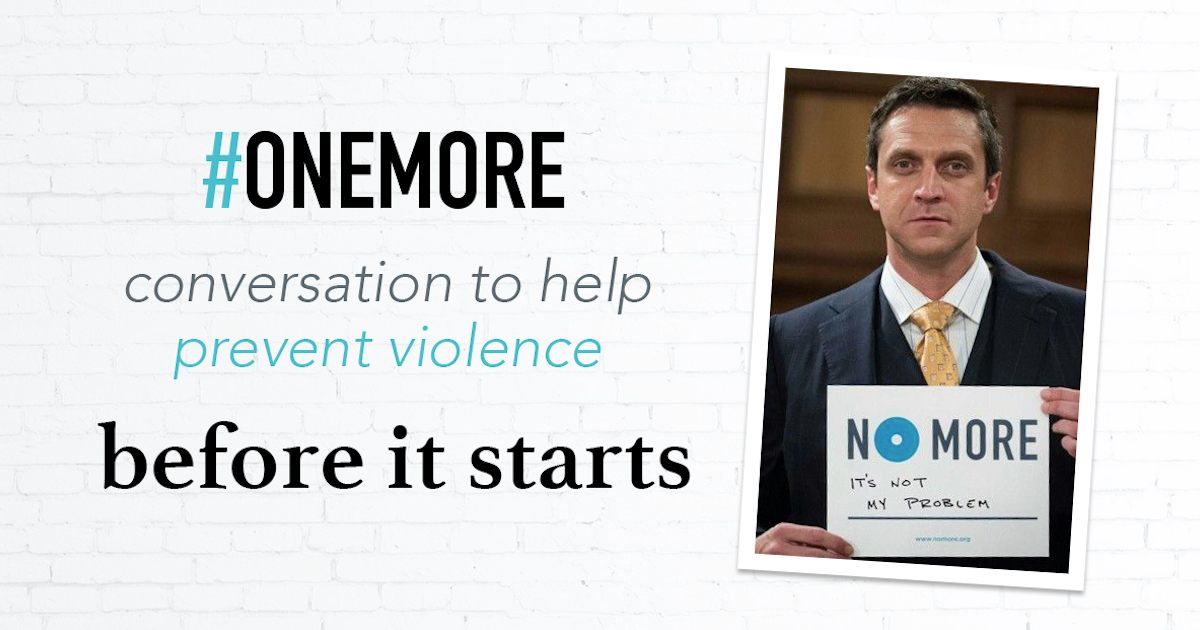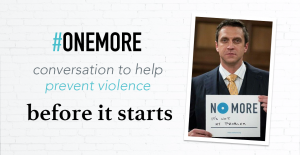Speak Out, Save Children, Say NO MÁS

From research on my role in Law & Order: SVU as ADA Rafael Barba, I’ve encountered heart breaking stories that often impact children. Whether children are witnessing domestic violence or other crises, I’ve learned that anyone who steps in to assist a child in crisis can change that child’s life for the better.
As a first generation Cuban American, I have firsthand experience on how our families extend so much further than the circle we grow up in or the house we live in day to day. Friends, colleagues, yes, maestras can be our family. There’s a saying in Spanish, Dime con quién andas y te diré quién eres. I’d translate that pretty loosely as Tell me who you hang with and I’ll tell you where you fall. Or who you are. These people outside of our homes can be just as powerful an influence in our lives as our own parents.
When I was 12, I met the woman who would transform my life. My teacher, Beatriz Jimenez, taught me more than language and history. She taught me to imagine life beyond Miami, how to become curious about the world and what I could contribute to it. She was always there for a word of advice or a perspective I hadn’t considered.
In Spanish, the word maestra, teacher, has the same root as the word madre, mother, and, truly, that’s who she became for me: a second mother.
So believe it or not, we – the teachers, uncles, mentors, and father figures – we’re all potentially heroes for the children in our lives. Because of our influence, when we talk to the children in our lives about important issues – especially when it comes to dating and relationships – we have a real opportunity to help shape the kinds of people they’ll grow to be.
That’s the message of the new bilingual PSA campaign from DECIMOS NO MÁS and it’s true. It’s encouraging all the heroes out there to talk to the children in their lives about healthy relationships as part of a national effort to help end domestic violence and sexual assault.
The campaign, created in partnership with Verizon, Casa de Esperanza: National Latin@ Network, and NO MORE, reinforces that preventing violence and abuse doesn’t only mean intervening when a child in your life becomes entangled in an unhealthy relationship. It also means having conversations with kids even before they start dating, to help them understand what a healthy relationship is and is not.
According to the NO MÁS Study, commissioned by the Avon Foundation for Women, a surprisingly high number of Latin@ parents, 83%, said they were willing to talk to their children about domestic violence and sexual assault.
So how can we transform willingness to talk about a difficult subject, into actual, potentially life-saving conversations? By helping more adults understand what a conversation looks like and giving them the tools to start talking.
Here are some tips to help you get started:
- Take the initiative. If you watch TV with your nieces and nephews, take time afterward to talk about the positive and negative relationship themes on screen. It can be that easy to get them talking about what they see as healthy and unhealthy.
- If you feel nervous talking about dating and relationships with a kid, it’s ok to admit that. Remember to be open and honest with them (it might even help ease some of the tension). Even more important than having all the answers, is to have an open and honest dialogue. Educate yourself, practice saying the words that make you uncomfortable, and just keep trying. Don’t give up.
- Don’t be afraid to share examples from your own life. Your experiences can be some of the most effective, relatable ways to explain what is and is never acceptable in relationships. Your honesty may be just the thing to help them open up as well.
- Be patient. Sometimes it takes a while for children to get their story out or ask their questions, perhaps because they are young or are just having difficulty asking you about a sensitive subject.
- Listen. Find time to give the kids in your life your undivided attention. Listen to them and let them know they’re important to you, that you respect them and that you’re really invested in their health, safety and happiness.
- On the heels of NO MORE Week sponsored by Mary Kay (March 6-12), an annual season of activation and awareness to help prevent domestic violence and sexual assault, thousands across the country answered the call to make these issues a priority. And now we need to continue to do our part. Check in with the children in your life and support them in navigating what it means to have a healthy relationship.
Learn more at www.decimosnomas.org or www.wesaynomas.org.
Together We Can End Domestic and Sexual Violence







